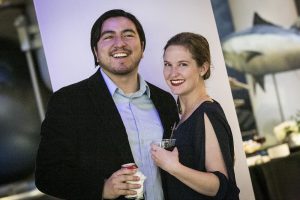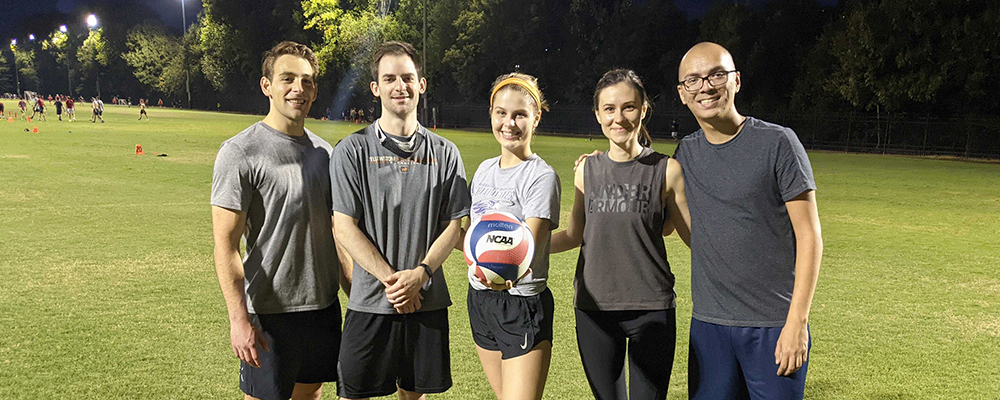
Meet Diego Malaver ‘17, a data scientist at Wake Forest Baptist Medical Center in Winston-Salem, North Carolina. As a student at UNC-Chapel Hill, he majored in biology and economics and served as an associate producer and host for the student radio station. His varied experiences revealed a unique passion for enhancing lives through data, which led him to the Institute for Advanced Analytics. We asked him to reflect on his journey from becoming an MSA student to an analytics professional and practicum sponsor.
Diego, your LinkedIn profile sparks curiosity for onlookers wondering how you ended up in Analytics. You majored in biology and economics while volunteering in hospitals and working with the Autism Society of North Carolina. From the outside looking in, it seems you were headed down the path toward a career in medicine or healthcare. How did your interest in analytics develop?
It’s true, from the outside looking in, I was on track for something clinical. I remain deeply interested in genetics, and while at UNC, my favorite courses were those with some modeling rigor. I was immediately drawn to economics and hoped eventually to forge a career at the intersection of health and mathematics.
In my spare time, I hosted an NBA radio show for the university. I enjoyed diving deep into the world of basketball analytics; I began incorporating more NBA analyses in my econometrics papers, and that fueled my segments on the radio. Rifling through analytics techniques for NBA analyses is how I dove into the greater world of analytics and found the Institute. The Institute offered a wealth of knowledge in an immersive and concentrated one-year period. As a data scientist at a large academic research medical center, I’ve found it very possible to better medicine/healthcare and not be a doctor or lab scientist. Medicine is a very collective enterprise. I am accelerating the emergence of policy, procedures, and medications that improve the way medicine is practiced and uncovering novel disease pathways by harnessing the power of analytics.
Looking back on your time in the MSA program, did you consider working in a different industry? How did the practicum or career placement activities impact your decision-making process?
Entering the Institute, I was eager to find a position in healthcare, but I took the excellent advice of the faculty to cast a wide net. I knew I was keen to join a nonprofit research and social impact group whose mission is to use data science for good. I quickly found, however, that I was most impressed by the presentations of banking and technology firms because they were so ahead of the game. They seemed genuinely dedicated to supporting their staff through lifelong learning initiatives; they understood that their data scientists were a significant reason as to why they were excelling in business. I could have just as eagerly chosen an industry other than healthcare due to their dedication to fostering team-based data science and staying up to date with the latest algorithms/techniques. Ultimately, my practicum project with Verscend Technologies (formerly Verisk Health), a healthcare analytics company, fixed my desire to begin my career in the healthcare industry. However, I am constantly amazed by what my peers are doing in other domains.
Your current position at Wake Forest Baptist Health seems like a wonderful combination of your passion for healthcare, economics, and analytics. How did you find this opportunity? Did you seek it out intentionally or was it one of many options you considered?
Yes, it is! I am very fortunate. Before accepting the position with WFBH, I was evaluating offers from financial, sports, and tech firms. The opportunity arose through the Institute — Dr. Herrington, my supervisor (MD/analytics practitioner), personally conducted interviews to search for a candidate best fit for a fast-paced academic research institution. Our interests aligned, and I am very grateful to have data science at WFBH be my first step in my analytics career.
We see a lot of prospective students on the science/pre-med track who want to make a difference in the world but simply are not passionate about traditional careers as healthcare providers. Can you tell us a bit about what type of work you do within a large healthcare organization like Wake Forest Baptist and how data scientists like yourself can use their talent for the greater good?
My mission at WFBH is to train and assist investigators in asking and answering questions with data. Through applications of data mining, machine learning, and statistics, we uncover what is buried deep in metabolomics, population, and pharmaceutical data. I get to tackle disparities of health in socioeconomic groups and design novel techniques and algorithms to find sick communities, assess the performance of new medications/procedures, and apply practical and sophisticated algorithms to highly multidimensional “omics” data. My role also involves managing quality improvement initiatives where we measure how the institution can continue to help a growing population while maintaining low costs with limited resources. I accelerate bench-to-bedside research through openness, education, and providing a full breadth of expertise found nowhere else in our academic research institution. I believe that data science, like other research endeavors, is best practiced outside of a vacuum; exposure to multiple domains at the Institute makes one a more capable data scientist. If you have a passion for modeling, life sciences, and collaboratively solving challenging problems, then you meet the rapidly growing market for data scientists in healthcare.
What advice would you have for others, like you, who do not come from traditional business/math backgrounds but want to use their academic talents to make a difference in the world?
Data is a product of our technologically reliant society, and we need data science leaders like we need leaders in all sectors of society advocating for a better world. Data scientists meet the needs of an ever-changing, more complex society with massive quantities of data. Analytics gives you the flexibility to choose any industry in the world. Your training, and most importantly, thirst for learning, make you a precious resource for a variety of institutions and should empower communities and elevate society.
Having gone through the practicum experience yourself, what prompted you, or your team, to propose a project for the MSA Class of 2020?
As a graduate of the Institute, I know what the students are capable of producing. I was hoping to give the team a real-world significant and contemporary problem in biomedical research. Molecular epidemiologists seek to determine the strength of association between many thousands of molecules and specific clinical traits (e.g. heart attacks) to gain insight into disease etiology. I am excited to challenge and harness the analytical capabilities of the students to explore the complex hierarchical and non-linear correlational structure of the data with conventional approaches but also to explore some of the newer learning tools.
Finally, do you have any advice for MSA students to help them make the most of their practicum experience?
Open yourself to grappling and struggling with programming and mathematical concepts. You have to trust the process — this immersive experience will challenge you, and your toughest moments will often be when your most profound learning will occur! Take advantage of the time you have to experiment with different techniques in your practicum. The more you challenge yourself, the better you’ll be at learning and producing on the job. Data science is a life-long educational endeavor.
